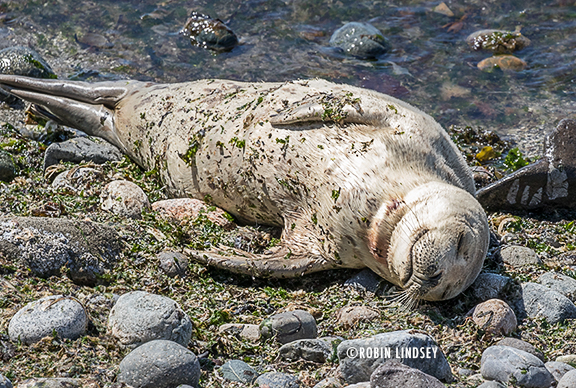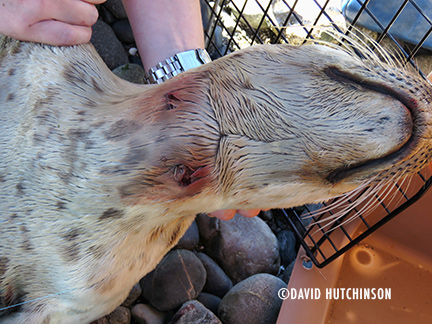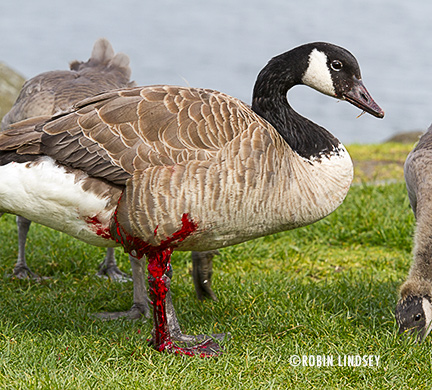Nova
Harbor seal dies after apparent attack by large dog
Aug/02/16 05:47 AM

In a sad and disturbing turn of events, a juvenile harbor seal was the apparent victim of an attack by a large dog. Following rescue from a West Seattle beach by Seal Sitters MMSN, the seal died overnight at PAWS Wildlife Center on Wednesday, July 27.
The seal was reported resting at Constellation Park, also known as Charles Richey Viewpoint Park, late that morning (photo above). First Responders located the small animal near the sea wall and closed the ramp leading down to the beach. Tape and signs were strung along the metal railing above the pup to keep people from leaning over and scaring her back into the Sound. Undisrupted rest is crucial to survival.
When the light-coated seal rolled over onto her back, two distinctly parallel puncture wounds were noticed on the throat. Constellation is a notorious destination for people with off-leash dogs and First Responders were immediately suspicious. Photos were taken with a long telephoto lens and sent to a WDFW Marine Mammal Investigations Unit (WDFW-MMI) biologist for review. The wounds were confirmed consistent with attack by a canine. However, the seal returned to the water as high tide erased the beach she was resting on.
Several hours later, Seal Sitters’ dedicated hotline (206-905-7325) received a call from a homeowner who had a seal on her beach. She was concerned that people with off-leash dogs often accessed the beach at low tide.
The seal was lethargic, dehydrated and looked markedly thin. The neck wounds, viewed from a different angle, appeared terribly infected. Salt water can sometimes heal wounds, depending on location and severity. A text was sent to Seattle Aquarium veterinarian Dr. Lesanna Lahner. After a health consultation on the beach, she recommended immediate transport to PAWS for treatment. Since the injury was suspected to be inflicted by a domestic dog, the case was classified as human interaction and, therefore, an unnatural predation.

The wounds were consistent with those inflicted by a large dog - larger punctures and “less professional” than coyote bites. Since the attack was not witnessed (or at least reported) by anyone and the seal was found in an area known for off-leash dogs, the expert opinion was apparent predation by a large domestic canine. Tissue and blood samples have been sent out to a lab for analysis.
Upon exam, it was determined that the female seal was a juvenile and terribly thin, weighing only about 14kg (close to the birth weight of a seal pup).
Harbor seals are extremely vulnerable on land since, unlike sea lions, they can’t rotate their rear flippers for locomotion. Using only their front flippers, they move much like a caterpillar on the beach. Seals need to rest long hours out of Puget Sound’s frigid waters to warm up and gain the strength to forage. Unless close to the water’s edge, a seal - most especially, a very young, struggling or sleeping one - probably cannot escape a charging dog.
Countless times each year, Seal Sitters First Responders and our stranding network volunteers have conversations with people who have taken their dogs on the beach, illegal in Seattle Parks (read the ordinance here). A few are leashed, but the vast majority run free or chase after sticks and balls thrown into the water - on practically every beach in West Seattle. Often, the dogs can be seen on their own, exploring around the woody debris high up on the beach at Lincoln Park, where tired harbor seal pups sometimes will rest after a high tide.

Dogs have a keen sense of smell and curiosity and instinctively chase other animals and birds. This includes the off-leash dog that viciously attacked an adult Canada Goose on the shore of Elliott Bay (at right, the bird survived after a lengthy rehab and was reunited with his mate and goslings). Or, the off-leash dog that injured one of Lincoln Park’s iconic and beloved white geese, who recovered.
Two years ago, there were a number of seal pups with suspect puncture wounds along West Seattle’s stretch of Puget Sound shoreline. Additionally, Seal Sitters has witnessed dogs that have chased seal pups back into the water, barely missing tearing into the rear flippers. Seals are protected from harassment and harm by the Marine Mammal Protection Act, violations of which are punishable by fine or imprisonment. NOAA recommends a distance of 100 yards from marine mammals whenever possible to avoid disturbance of their natural behavior.
“We’re so fortunate to live in a city that loves its animals, and we need to be responsible pet owners. Dogs are not allowed on Seattle beaches and must be kept on a leash in parks, except in designated off-leash areas,” said Brett Rogers, Seattle Animal Shelter regulatory compliance supervisor. “Owners who disregard the law are subject to various fines and penalties. Much more important than the financial disincentive, however, is safety. Not only do we need to be mindful of the needs of the wildlife that share our shores, our dogs rely on us to keep them safe from harm and from doing harm.”
All wildlife is in a daily struggle to survive, requiring many hours of foraging. They need stress-free rest, to conserve energy and recharge, as do all living things. A dog who disrupts this cycle can cause their decline and demise. Even worse, the dog who gets hold of wildlife can cause grave injury and death. There are certainly many, many attacks by off-leash dogs that go unknown or unreported. Enough is enough.
It is heartbreaking to think that this seal was terrorized by a domestic dog, one who should never have been on a beach. First seen at Constellation Park, the small seal was nicknamed Nova, which is the sudden brightness of a star.
Media, please click here for list of contacts for Seal Sitters, NOAA, PAWS, Seattle Animal Control and Seattle Aquarium veterinarian.
PLEASE NOTE:
We want to stress that Seal Sitters is by no means “anti-dog”. Many of us own and/or think the world of dogs. We are supportive of well-designed and conveniently located off-leash areas where dogs can get the exercise they need - safely, for both dogs and wildlife.
We ask all dog owners to be respectful and obey the common sense leash laws, so that everyone can enjoy the unique variety of wildlife that shares our neighborhoods and beaches.
It is now harbor seal pupping season and not unusual to find harbor seal pups resting on shore. Most often, a lone young seal will be a weaned pup or juvenile. A seal pup alone on shore that is still nursing age is usually the result of some kind of disturbance. The mom may abandon her pup if she feels it is not safe. Please stay back and call your local stranding network. In West Seattle, call Seal Sitters hotline @ 206-905-SEAL (7325).
To learn more about harbor seals and the work of NOAA’s Marine Mammal Stranding Network, please visit Seal Sitters’ website.







